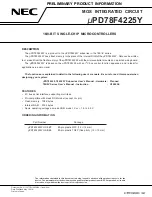
381
CHAPTER 20 UART2, UART3
■
Inter-CPU Connection Method
External Clock One-to-one connection (normal mode) and master/slave connection (multiprocessor mode)
can be selected. For either connection method, the data length, whether to enable parity, and the
synchronization method must be common to all CPUs. Select an operation mode as follows:
•
In the one-to-one connection method, operation mode 0 or 2 must be used in the two CPUs. Select
operation mode 0 for asynchronous transfer mode and operation mode 2 for synchronous transfer mode.
Note, that one CPU has to set to the master and the other to the slave in synchronous mode 2.
•
Select operation mode 1 for the master/slave connection method and use it either for the master or slave
system.
■
Synchronization Methods
In asynchronous operation UART2, UART3 reception clock is automatically synchronized to the falling
edge of a received start bit.
•
MB90V390H/MB90F394H(A):
Start bit detection is level sensitive. This means that a start bit is
detected immediately if SCR2/SCR3:RXE bit is set to "1" while the serial data input SIN2/SIN3 is "0".
A received start bit is memorized even when SCR2/SCR3:RXE bit is set to "0". This causes immediate
start of reception after SCR2/SCR3:RXE bit is set to "1" again. As a workaround, reset UART2,
UART3 by writing "1" to SMR2/SMR3:UPCL bit after setting SCR2/SCR3:RXE bit to "0".
•
MB90V390HA/MB90V390HB/MB90394HA:
Start bit detection is edge sensitive. This means that a
start bit is not detected before the next falling edge on the serial data input SIN2/SIN3 if SCR2/
SCR3:RXE bit is set to "1" while SIN2/SIN3 is "0". A received start bit is not memorized after SCR2/
SCR3:RXE bit is set to "0". This means that when SCR2/SCR3:RXE bit is set to "1" again, reception
starts when a start bit is detected.
In synchronous mode the synchronization is performed either by the clock signal of the master device or by
UART2, UART3 itself if operating as master.
■
Signal Mode
UART2, UART3 can treat data only in non-return to zero (NRZ) format.
■
Operation Enable Bit
UART2, UART3 controls both transmission and reception using the operation enable bit for transmission
(SCR2/SCR3:TXE) and reception (SCR2/SCR3:RXE).
•
If reception operation is disabled during reception (data is input to the reception shift register), finish
frame reception and read the received data of the reception data register (RDR2/RDR3). Then stop the
reception operation.
•
If the transmission operation is disabled during transmission (data is output from the transmission shift
register), wait until there is no data in the transmission data register (TDR2/TDR3) before stopping the
transmission operation.
Summary of Contents for MB90390 Series
Page 2: ......
Page 4: ......
Page 17: ...xiii APPENDIX D List of Interrupt Vectors 690 INDEX 695 ...
Page 18: ...xiv ...
Page 132: ...104 CHAPTER 5 CLOCKS ...
Page 152: ...124 CHAPTER 6 CLOCK MODULATOR ...
Page 210: ...182 CHAPTER 11 TIME BASE TIMER ...
Page 218: ...190 CHAPTER 12 WATCHDOG TIMER ...
Page 264: ...236 CHAPTER 14 16 BIT RELOAD TIMER WITH EVENT COUNT FUNCTION ...
Page 274: ...246 CHAPTER 15 WATCH TIMER ...
Page 306: ...278 CHAPTER 17 DTP EXTERNAL INTERRUPTS ...
Page 338: ...310 CHAPTER 18 8 10 BIT A D CONVERTER ...
Page 364: ...336 CHAPTER 19 UART0 UART1 ...
Page 398: ...370 CHAPTER 20 UART2 UART3 Figure 20 5 2 ORE Set Timing Receive data RDRF ORE ...
Page 432: ...404 CHAPTER 20 UART2 UART3 ...
Page 482: ...454 CHAPTER 22 SERIAL I O ...
Page 560: ...532 CHAPTER 24 STEPPING MOTOR CONTROLLER ...
Page 582: ...554 CHAPTER 27 ROM MIRRORING MODULE ...
Page 632: ...604 CHAPTER 29 EXAMPLES OF SERIAL PROGRAMMING CONNECTION ...
Page 722: ...694 APPENDIX ...
Page 723: ...695 INDEX The index follows on the next page This is listed in alphabetic order ...
Page 740: ......
















































